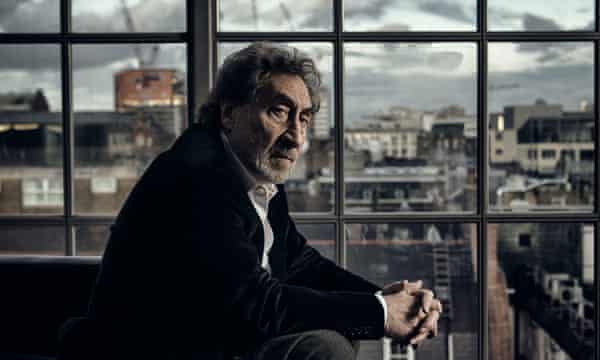 |
| Howard Jacobson |
Howard Jacobson: 'I am a social distancer by instinct'
The novelist was in Tenerife when news of Covid-19 hit. He reflects on a month of uncertainty and the search for hand sanitiser
Howard JacobsonSaturday, 28 March 2020
“It was about the beginning of September, 1664, that I, among the rest of my neighbours, heard in ordinary discourse, that the plague was returned again in Holland... ” So begins Daniel Defoe’s A Journal of the Plague Year.
It was about the beginning of 2020 that I heard a new plague was heading this way from China. On the morning of 27 February I sat with my wife Jenny in a cafe in La Caleta, a pretty fishing village in Tenerife, which we were leaving to go home to London later that day. But for the calima, when wild winds lifted the Sahara and deposited it on our living-room floor, we’d been enjoying glorious weather. This morning was cruelly beautiful. We didn’t want to leave. But while there had been only one reported case of coronavirus on the island, we weren’t entirely convinced the authorities were on top of it; we weren’t sure how well-equipped for dealing with a severe outbreak they were; and we thought that if it did come to hospitalisation, at least in London we spoke the language. We no sooner took that decision than we regretted it. A sadness settled on us – a calima of the spirits – that hasn’t lifted.
A plane is not a comfortable place to be when the proximity of other people makes you anxious. This was early in the scare and no one was talking yet of social distancing let alone isolation, but I am a social distancer by instinct. The immigration hall at Gatwick was deserted. Once clear of customs, I bought the first English paper I’d read in days. “UK warns against mass panic as race to halt outbreak intensifies,” the Guardian proclaimed. So that was what we’d left the silvery-sweet air of La Caleta for: mass panic.

The next day we meet friends down from Manchester for lunch. They are in as much of a hurry not to kiss us as we are not to kiss them. We substitute some clumsy elbow banging. Jenny favours the Hindu namaste. I favour backing out of the restaurant. I don’t follow any of the conversation. I am not a good concentrator on other people at the best of times, but dread has now taken up all the room in my attention. At the next table people in their 20s are hugging and kissing.
Jenny shops for sanitising gels and wipes only to discover when she gets them home that they are the wrong gels and wipes. We aren’t killing bacteria, we are killing a virus. I don’t want to admit I don’t know the difference. Something’s got it in for us. Who cares what it’s called. But details matter. To be effective against the virus, sanitisers have to be 60% alcohol. “Why don’t I just breathe on every surface,” I joke. But even I don’t find me funny.
Jenny goes on one of her marathon trawls through the world’s online retailers. Only 20 infected and one dead and already every chemist has run out. Boris Johnson appears on television flanked by experts. I marvel that we have any left after the contempt shown to them by Brexiters. This is the first time I have seen the prime minister without a single inane grin on his face. Has something finally struck him as unsmirkful? But looking urgent isn’t the same as acting with urgency. Where are the sanitisers?
Somehow Jenny finds some that clip to your lapel like badges. I feel I’m warding off a vampire with a clove of garlic. She has stumbled in her researches on to a wipe for anus whitening. “There are still things I don’t know,” she says. “Why does anyone want to whiten their anus?” I ask. However little she knows, I know still less.
But it increases my sadness to be given this reminder of the ingenuity of human playfulness and desire, and to think how our incorrigible variety is being brought low, robbed of its virtuosity and joy, reduced to a single pitch of panic, by a virus. It is absurd to anthropomorphise Covid-19, but like all pestilence it is puritanical in intent. Its purpose is to flatten us out.
The infected rate continues to rise. We have to be told, but I’d still prefer not to know. Let the dead number the dead. I ring my sister in Manchester to see how she and my 97-year-old mother are getting on. Fine. Fine? Yes, fine. “What will be will be,” my sister says. We grew up in the same house: where the hell did she learn that philosophy?
I have taken to wearing gloves when I venture out but get confused as to whether I need to keep them on or take them off to touch my face. If I’ve sanitised my hands before putting on gloves, does that mean the gloves are sanitised from the inside? Or will they have contaminated my hands? I drop my bottle of gel and don’t know whether to pick it up gloved or ungloved. I look around to see who’s witnessing this sad fiasco. No one is. The streets are empty.
THE GUARDIAN

No comments:
Post a Comment